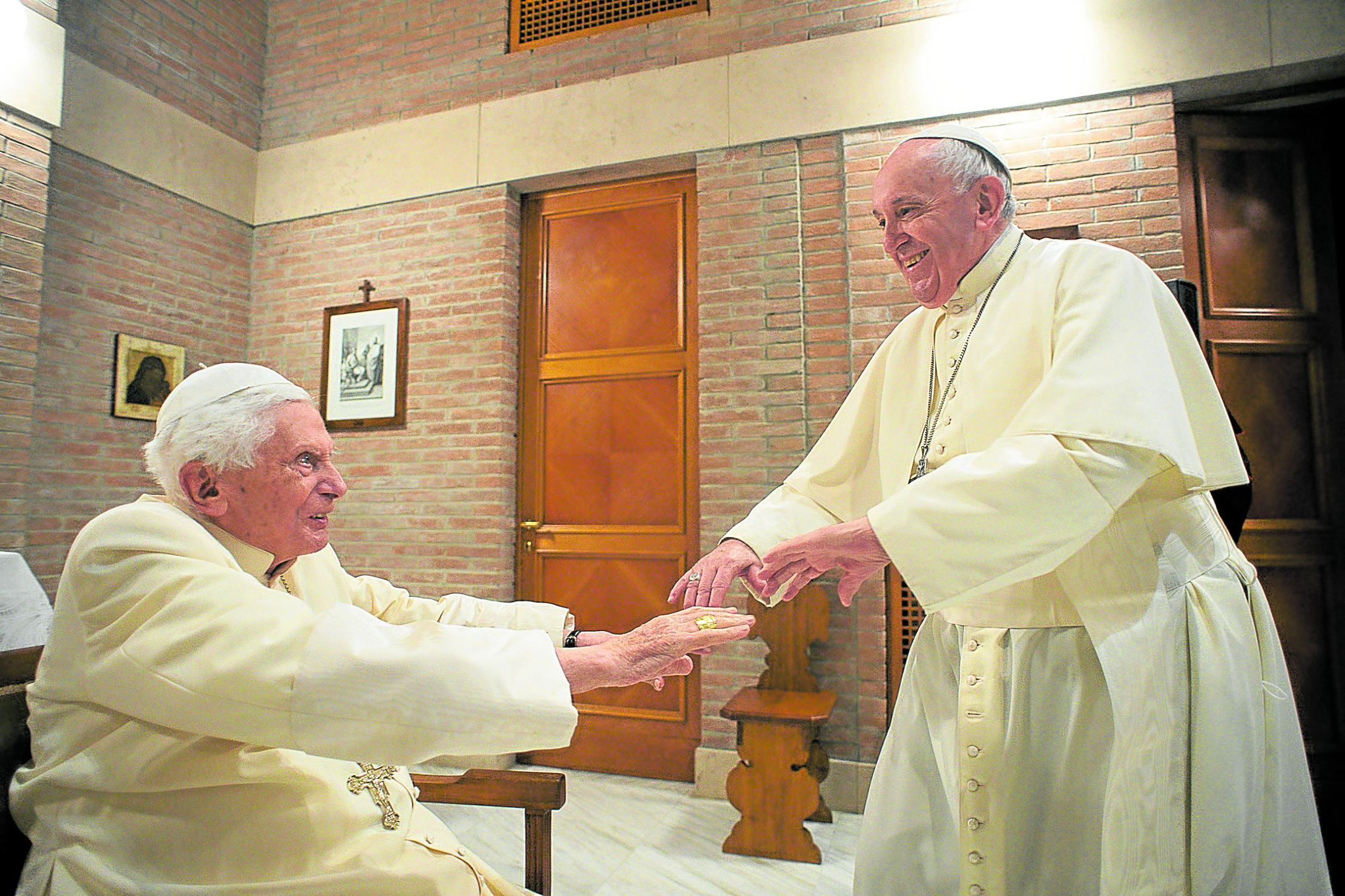
THE TWO POPES Pope Francis greets his predecessor during a meeting in 2020. Pope Benedict XVI had good relations with his successor, but conservatives were alarmed by Francis’ progressive moves and looked to Benedict for guidance. —REUTERS
Former Pope Benedict XVI has died at the age of 95, almost a decade after he became the first pontiff to resign in six centuries.
Vatican spokesperson Matteo Bruni said in a statement that Benedict passed away at 9:34 a.m. on Saturday at the Mater Ecclesiae Monastery in the Vatican.
The German pope emeritus, whose birth name was Joseph Ratzinger, had been living a quiet life in a former convent inside the Vatican grounds since his shock decision to step down in February 2013.
He announced his resignation in Latin, telling cardinals he was too old and frail to lead an institution with more than 1.3 billion members. He was the first pope since 1415 to give up the job as head of the Catholic church.
His health had been declining for a long time. On Wednesday, the Vatican said his condition had worsened.
His death brings to an end an unprecedented situation in which two “men in white”—Benedict and Pope Francis—had coexisted within the walls of the tiny city state.
Guardian of tradition
Benedict had good relations with his successor, Francis, but his continued presence inside the Vatican after he stepped down in 2013 further polarized the Church ideologically.
Conservatives alarmed by Francis’ progressive moves looked to Benedict as the guardian of tradition. Several times he had to tell nostalgic admirers via visitors: “There is one pope, and it is Francis.”
His papacy was beset by Vatican infighting and a scandal over clerical sexual abuse of children that rocked the Catholic Church the world over, in which he was criticized for a lack of leadership.
The abuse scandal overshadowed his final months after a damning report in January 2022 accused him of personally failing to stop four predatory priests in the 1980s while archbishop of Munich.
Shaken by the report, he acknowledged in an emotional personal letter that errors had occurred and asked for forgiveness. His lawyers argued in a detailed rebuttal that he was not directly to blame.
In an essay in 2019, he blamed the crisis over the abuse of children by priests on the effect of the 1960s sexual revolution, what he called homosexual cliques in seminaries and a general collapse in morality.
Critics accused him of trying to shift the blame away from the hierarchy of the institutional Church.
He antagonized Muslims by appearing to suggest that Islam was inherently violent and angered Jews by rehabilitating a Holocaust denier.
Gaffes, missteps
The gaffes and missteps culminated in 2012, when leaked papers revealed corruption, intrigue and feuding within the Vatican.
Ratzinger was born on April 16, 1927, in Marktl am Inn, in Bavaria.
As a teenager he was forcibly enrolled in the Hitler Youth during World War II and was briefly held by the Allies as a prisoner of war, but he was never a member of the Nazi party.
He became a priest in 1951 and gained attention as a liberal theological adviser at the Second Vatican Council, which opened in 1962 and led to a profound reform of the Church.
Benedict was 78 when he succeeded the long-reigning and popular Pope John Paul II in April 2005, the first German pope of the modern era.He later said his election felt “like the guillotine.”
Emotional farewell
“There were moments of joy and light, but also moments that were not easy … There were moments … when the seas were rough and the wind blew against us and it seemed that the Lord was sleeping,” Benedict told his last general audience of more than 150,000 people in an emotional farewell.
Unlike his successor, a Jesuit who delights in being among his flock, Benedict was a conservative intellectual dubbed “God’s Rottweiler” in a previous post as chief doctrinal enforcer.
While there is no rulebook for former popes, Benedict’s funeral is expected to be at the Vatican, presided over by Francis.
In 2005, the body of John Paul II lay in state before a funeral Mass at St. Peter’s Square attended by 1 million people, including heads of state. —REPORTS BY AFP AND REUTERS
RELATED STORIES
Former Pope Benedict dies aged 95
Former Pope Benedict was first pontiff to resign in 600 years